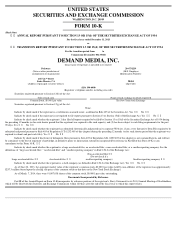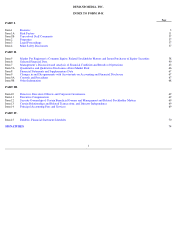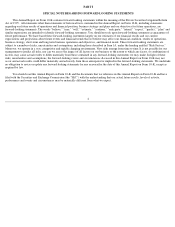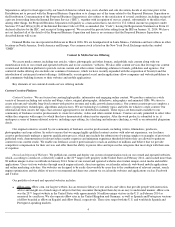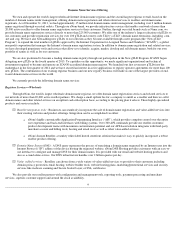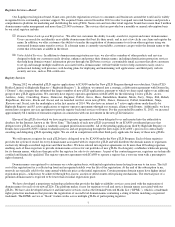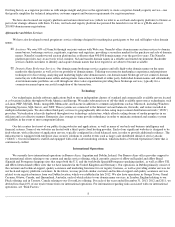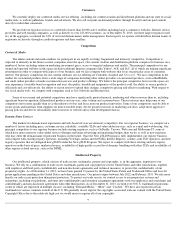Enom 2013 Annual Report Download - page 12
Download and view the complete annual report
Please find page 12 of the 2013 Enom annual report below. You can navigate through the pages in the report by either clicking on the pages listed below, or by using the keyword search tool below to find specific information within the annual report.
Regulation
Advertising and promotional information presented to visitors on our owned and operated websites and our other marketing activities are
subject to federal and state consumer protection laws that regulate unfair and deceptive practices. In the United States, Congress has adopted
legislation that regulates certain aspects of the Internet, including online content, user privacy, taxation, liability for third-party activities and
jurisdiction, including the Communications Decency Act, the Digital Millenium Copyright Act, the Lanham Act and the Anticybersquatting
Consumer Protection Act. Since we operate large consumer-
facing websites, we are also subject to state, federal and foreign laws and regulations
governing privacy of users search habits and other information and data protection of consumers’ non-public personal information and
preferences.
Federal, state, local and foreign governments are also considering other legislative and regulatory proposals that would regulate the
Internet in more and different ways than exist today, including with respect to taxes. It is impossible to predict whether new taxes will be impo
sed on our services, and depending upon the type of such taxes, whether and how we would be affected. Increased regulation of the Internet both
in the United States and abroad may decrease our growth and hinder technological development, which may negatively impact the cost of doing
business via the Internet or otherwise materially adversely affect our business, financial condition or results of operations.
Compliance with complex foreign and U.S. laws and regulations that apply to our international operations increases our cost of doing
business in international jurisdictions and could interfere with our ability to offer our products and services
in one or more countries or expose us
or our employees to fines and penalties. For example, as a U.S.-
based entity, Demand Media and its subsidiaries are obligated to comply with the
economic sanctions and regulations administered by the United States Treasury’s Office of Foreign Assets Control (“OFAC”). OFAC
regulations prohibit U.S.-based entities from entering into or facilitating transactions with, for the benefit of, or involving the property of,
persons, governments or countries designated by the U.S. government under one or more sanctions regimes, which could include transactions
that provide a benefit that is received in an OFAC designated country. We may be subject to material fines, sanctions or other penalties if certain
of our domain name customers register domain names in countries that are subject to U.S. sanctions and embargoes, including
Cuba. Additionally, some of the products and services we provide to customers globally may require approval under applicable U.S. export law.
As the list of products and countries requiring export approval expands or changes, government restrictions on the export of software and
hardware products utilizing encryption technology may grow and become an impediment to our growth in international markets. If we do not
obtain required approvals or we violate applicable laws, we may not be able to provide some of our services in international markets and may be
subject to fines and other penalties.
The registration of domain names generally is governed by Internet regulatory bodies, predominantly ICANN. ICANN maintains contracts
with member entities such as registrars and registries through which it enforces compliance with its Consensus Policies. While these policies do
not constitute law in the United States or elsewhere, they have a significant influence on the operation and future of the domain name registration
system, inc luding the operations of both registrars and registries and how they interact with one another. The regulation of domain names in the
United States and in foreign countries has evolved over the past two decades and may continue to change. ICANN and other regulatory bodies
could modify existing, or establish additional, requirements for the registration of domain names generally, including those for previously
registered domain names. In addition, ICANN could adopt or promote policies, including its Consensu
s Policies, or adopt unfavorable unilateral
changes to the terms of the registry operator agreements for new gTLDs, including gTLDs that are or have been delegated to us, which could
impact how we operate our registrar and registry businesses or affect our competitive position. For example, Specification 9 of the form registry
operator agreement for new gTLDs currently sets forth the guidelines for a vertically integrated company operating one or more registrars and
one or more registries, and ICANN may materially change these guidelines or prohibit such vertical integration in the future.
Within the U.S. government, oversight of the DNS is provided by the U.S. Department of Commerce. Effective October 1, 2009, the U.S.
Department of Commerce and ICANN entered into a new agreement, known as the “Affirmation of Commitments” which replaced the existing
agreement between ICANN and the U.S. Department of Commerce. Under the Affirmation of Commitments, the U.S. Department of Commerce
became one of several parties working together with other representative constituency members in providing an ongoing review of ICANN's
performance and accountability. The Affirmation of Commitments sets forth a periodic review process by committees which provide for more
international and multidiscipline participation. These review panels are charged with reviewing and making recommendations regarding (i) the
accountability and transparency of ICANN; (ii) the security, stability and resiliency of the DNS; (iii) the impact of new gTLDs on competition,
consumer trust, and consumer choice; and (iv) the effectiveness of ICANN's policies with respect to registrant data in meeting the legitimate
needs of law enforcement and promoting consumer trust. Under the Affirmation of Commitments, the Assistant Secretary of Communications
and Information of the U.S. Department of Commerce will be a member of the “Accountability and Transparency” review panel. The reviews
generally are to occur no less than every three to four years.
10


